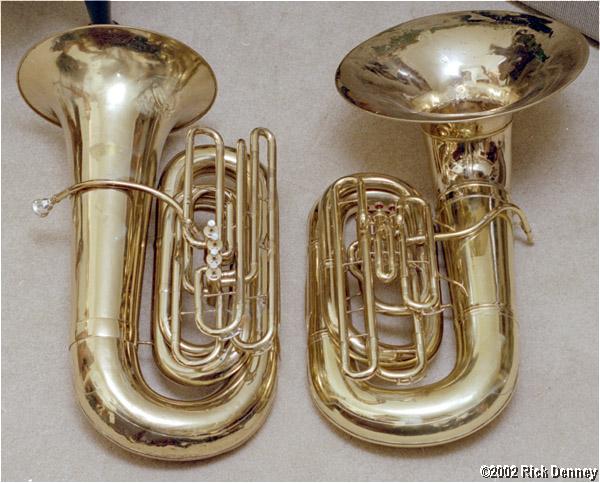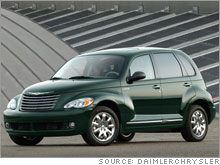Page 1 of 4
Posted: Sun Oct 01, 2006 6:01 pm
by iiipopes
No. It's a 5/4. BATs are at least 6/4.
The reason manufacturers calls something a "York" model is two reasons:
1) They have physically examined and taken measurements of a real York, usually one or both of the CSO instruments, and attempt to copy it to some degree, or
2) Blatant advertising to sell their largest tuba they make.
Posted: Sun Oct 01, 2006 7:36 pm
by clagar777
He just simply wants to know if anyone sees it as being a BAT. Everyone chill out.
Even though it is considered a 5/4, isn't it one of the tallest, if not the tallest tuba out there now? It isn't as fat as my instructor's York but it is much taller.
Seems like thats a question to ask when your looking to buy a horn, not after you've sunk a good deal of $$$ into it.
I doubt that would be a consideration for someone when buying a horn..."I don't know Mr. Perantoni, it plays great but it isn't big *** enough."
Posted: Sun Oct 01, 2006 10:40 pm
by quinterbourne
Many professionals consider a PT-6p to be the largest horn they need. It is a BAT. However, it is not an extremely large BAT - such as a Yorkbrunner, MW2165, Mel Culbertson, PT-7p or your Nirschl.
I agree that since you own the Nirschl, the PT-6 is not very useful. If I were you, I would sell one of those horns (but hey, that's just me) and purchase a nice 4/4 CC for brass quintet and most medium sized orchestral rep - save the PT-6/Nirschl for the Shostie, Prokofiev, Mahler, etc.
Isn't that the ideal arsenal for most serious orchestral players? 4/4 F, 4/4 CC and a 5/4-6/4 CC? I sure wish I had those...
Posted: Mon Oct 02, 2006 1:56 am
by windshieldbug
Posted: Mon Oct 02, 2006 3:16 am
by Z-Tuba Dude
MW215588: You are treating the word "BAT" as if it is a real term. It was just a funny name made up by one of the other TubeNetters, and not meant as any kind of definitive designation.
Anyway, does just labeling a horn as a "BAT" make it play any bigger? If so, I am going to start calling my HB-2 a "BAT", so I can save myself a TON of money!

Actually.....
Posted: Mon Oct 02, 2006 9:12 am
by Roger Lewis
If you look back at the recent flurry of auditions, there is a place for a great 5/4 as well as a 6/4 in the "arsenal". Alan Baer won three in a row on the Gronitz PCK. That is a good sized 5/4 instrument. He is now playing a Meinl Weston 6/4 horn for the job.
Sometimes playing the audition on a 5/4 will give you enough presence and sound to play with the section and to handle all the excerpts with a cleaner articulation. However, once you add in the rest of the orchestra, it may not be enough horn for proper balance, so that's when the 6/4 comes out. Granted many of us may not ever get to play with that good (and strong) a trombone section.
The PT6 is quite capable of doing the job under most conditions. Look at Jeff Anderson (San Francisco), Andrew Miller (Alabama), Carol Jantsch (Philadelphia), Steve Campbell (Minnesota), Stephen Dumaine (National), etc., etc.
Is it a B(ig) A(ss) T(uba)? I don't think it really falls into that category - it's more of a B(ig) T(uba).
As to York style tubas, I think the original definition came from how the leadpipe went into the valve section. But I think that line has been quite blurred now.
Just my $0.02
Roger
Posted: Mon Oct 02, 2006 12:52 pm
by Rick Denney
Z-Tuba Dude wrote:MW215588: You are treating the word "BAT" as if it is a real term. It was just a funny name made up by one of the other TubeNetters, and not meant as any kind of definitive designation.
Just like the quarter system, which in reality overlaps so much that it means nothing useful.
But if you were to stand a PT-6P next to a Yorkophone, the Yorkophone would definitely be bigger, even to non-tuba-player eyes. The BAT term is a slang catchall for the biggest tubas that includes a category I call "grand orchestral".
Yorkophones are marked by .750 valve tubing, low and vertically arranged front-action valves that imply sweeping turns in the valve branches going from the valves to the upper tuning slides, and very large (but not very tall) outer branches tapered approximately the way York tapered them. Some manufacturers use their Yorkophone valve branches on a range of instruments, and some make instruments bigger than Yorks with different designs.
Your average non-tuba player would look at my Holton and the CSO York, and find them to be very nearly the same except for the fifth valve, even when comparing the Bb and C versions. A Yorkbrunner, Nirschl, or Yamayork would also look the same--they are all Yorkophones. They are also BAT's. But the BAT class also includes such instruments as the Meinl-Weston 195 (Fafner), the Rudy Meinl 5/4 (the 6/4 is an uberBAT), the Neptune, and the Conn 2xJ, among others.
The PT-6, like the HB-21, the Gronitz PCK, and the Meinl-Westons 2155 and 2000, is intended to be a bit smaller, but still big enough for large orchestral work in the modern American tradition. They are usually used as grand orchestral tubas, and might be thought by some to be BAT's. It doesn't really matter what you call them; it matters what you do with them.
Rick "whose Holton stretches the Reunion Blues Grand Orchestral gig bag bar taut" Denney
Posted: Mon Oct 02, 2006 2:00 pm
by Tubaguy56
okay, I'm a little bit insulted now....
I own a gronitz pck, it's a bat, TRUST ME. I've played the nirschl, the holton, the pt6, and the gronitz, side by side. the gronitz is bigger than the pt 6 by ALOT, and it's size is almost the same as the nirschl. okay. As for alan baer switching, its not because he needed a bigger horn, the gronitz and the 6/4 meinl weston are the SAME BORE, and the bell flare is big enough, trust me. I'd just like to clear that up, the only reason you call a Gronitz a 5/4 is because gronitz does not MAKE 5/4 horn. *sigh* I dare you, somebody else call the gronitz a 5/4.....
Posted: Mon Oct 02, 2006 2:02 pm
by Tubaguy56
PS: BAT IS a real term, pro tubists use this term, I believe that is enough for it to be considered real, if you don't believe me, go read roger bobo's articles....
Posted: Mon Oct 02, 2006 2:45 pm
by sc_curtis
Tubaguy56 wrote:I dare you, somebody else call the gronitz a 5/4.....
Ok, the gronitz is a 5/4...

Posted: Mon Oct 02, 2006 2:47 pm
by Rick Denney
Tubaguy56 wrote:okay, I'm a little bit insulted now....
Which just emphasizes the silliness of the importance people place on the terms.
BAT may be a real term, but it's still slang, with a definition no more authoritative than the general agreement of people using it, Roger Bobo included. Was my 20J a BAT? Yes. Was it a grand orchestral tuba? No. Was it a 6/4? Yes. Was is a kaisertuba? No, even though it's bigger than some kaiser tubas and smaller than others. Of course "kaiser" just means "kingly" as in "grand".

If you want to call your PCK a BAT, then go right ahead. It's a tweener--too big to be a typical 5/4 (some of which are smaller than some 4/4 tubas) and too small to be a Yorkophone. Where is the BAT line? Somewhere right around there.
Rick "mindful that it is the instruments that give meaning to the terms, not the other way around" Denney
Posted: Mon Oct 02, 2006 3:46 pm
by MartyNeilan
Posted: Mon Oct 02, 2006 3:59 pm
by chipster55
I have a BAT, too - my Big *** Truck. But it's a 1/2 ton, so maybe the 3/4 ton & 1 ton guys don't think I have a BAT, but maybe the S-10, Frontier, etc. guys might think it's a BAT. In the long run, who cares???
Posted: Mon Oct 02, 2006 4:44 pm
by Tubaguy56
Okay, clarification, I said BAT was real term, I didn't say it was a defined term. My argument for the PCK is that it is equivalent in measurements to many of our so called "BAT's". Seriously, if someone wants to put he Gronitz PCK side by side with something that is considered a BAT, PLEASE, go ahead, you'll find that a gronitz more than qualifies for a bat. then again, what is a bat? this goes back to the fact its not defined, then again, I guess we should look at this literally, BAT, is a big *** tuba, the gronitz is a big *** tuba, I think thats a pretty simple thing right there. yes, everyone is correct, BAT doesn't really matter, but it sure is damn fun to say
Posted: Mon Oct 02, 2006 4:52 pm
by windshieldbug
Can the PT-Cruiser be considered a B.A.T.?


Posted: Mon Oct 02, 2006 5:10 pm
by Rick Denney
Bob1062 wrote:I had thought that "kaiser" meant a (very) large European rotary tuba.
No, "kaiser" means "king", as in Kaiser Wilhelm. Sorta like calling something "king size". It is used to denote large size, but I suspect it is a superlative, meaning that it applies to the largest size in a maker's line.
But the K in Gronitz's PCK stands for "kaiser", even with piston valves. I think we apply the rotary specificity only because most German tubas of that size are rotary tubas and it's the Germans who call their big tubas "kaiser". I'm not sure the Germans connect "kaiser" to "rotary".
Rick "speculating in hopes a German will enlighten us" Denney
Posted: Mon Oct 02, 2006 5:12 pm
by Rick Denney
Tubaguy56 wrote:...BAT doesn't really matter, but it sure is damn fun to say
Yup.
Rick "agreeing with everything you said" Denney
Posted: Mon Oct 02, 2006 6:29 pm
by Wyvern
Strange, when I had a PT-6 myself I thought it was a BAT - it seemed huge, but I now know it is only very large.
Out of interest I took some measurements when I had the PT-6 and found where the bell joins the bottom bow it is 17" circumference. That compares with 19" on my current Neptune which is a true 6/4 BAT.
The PT-6 does produce a big sound, but I think not quite the breath of a 6/4. However, maybe in the rotary version it is a Kaiser tuba. After all the Fafner is also classified a 5/4.
BA...whaaaa?
Posted: Mon Oct 02, 2006 7:09 pm
by Slamson
From my observation, you can buy a lot of so-called BATs, but they aren't BATs without BAPs.
Posted: Mon Oct 02, 2006 8:18 pm
by SplatterTone
... develop a standard system ...
I really think the Roy Benson TB-202 should be in there somewhere. There aren't many B-Tubas running around (green ones at that!)
http://www.musik-service.de/Roy-Benson- ... 639en.aspx






